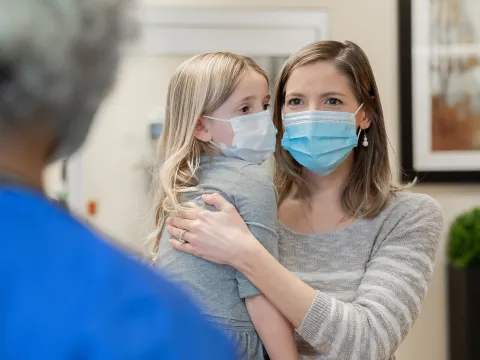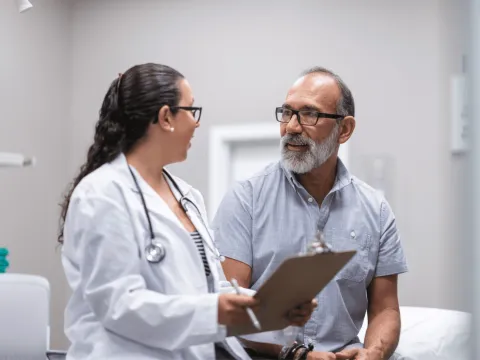- AdventHealth

Choose the health content that’s right for you, and get it delivered right in your inbox.
At AdventHealth Wauchula, we’re committed to providing high quality, safe and efficient care for patients. Learn here about common medical emergencies that can land you in the ER and how we strive to provide the best care possible.
Time is of the essence when you’re caught off guard with a medical emergency. It’s normal to feel shaken and scared, but we’re here to help 24/7, including on weekends and holidays, with our expert emergency department.
To reserve an emergency room visit online, click here and use the AdventHealth Wauchula InQuickER system that allows you to wait at home.
When to Visit the ER in Wauchula
Emergency rooms are for life-threatening injuries and medical conditions that can result in permanent damage or loss of life. These signs, symptoms and situations include:
- Abrasions or deep cuts
- Anaphylaxis/severe allergic reactions
- Bleeding uncontrollably
- Breathing difficulties
- Broken bones
- Chest pain
- Coughing up blood
- Loss of consciousness
- Major head injury
- Poisoning
- Pregnancy-related medical conditions
- Seizures
- Serious trauma
- Severe abdominal pain
- Severe burns
- Severe vomiting that hasn’t subsided for several hours
- Severely low or high blood sugar
- Sudden onset of severe pain
- Suspected heart attack
- Suspected stroke
Seek emergency care right away or call 911 if you experience any of the above.
Common Medical Emergencies
Some of the most common life-threatening medical emergencies are heart attack, stroke, seizures and severe allergic reactions. Here’s what to look for if you think you might be experiencing one.
Heart Attack Emergencies
A heart attack happens when the flow of oxygen-rich blood in one or more of the coronary arteries, which supply the heart muscle, is suddenly blocked and a section of heart muscle can’t get enough oxygen.
These are some common heart attack signs and symptoms:
- A cold sweat
- Crushing chest pain
- Fainting or lightheadedness
- Nausea
- Pressure and/or discomfort or pain elsewhere in the upper body, neck or arms
- Shortness of breath
If blood flow isn’t restored quickly, either by medicine that dissolves the blockage or a catheter placed within the artery that physically opens the blockage, the section of heart muscle begins to die. If you or someone you love might be experiencing a heart attack, call 911 right away so you can get to the emergency room for fast treatment.
Stroke Emergencies
A stroke occurs when the blood supply to part of the brain is interrupted or reduced. This prevents brain tissue from getting oxygen and nutrients, and brain cells begin to die in minutes. You may be at higher risk for a stroke if you:
- Are African American
- Are Hispanic
- Are sedentary
- Are overweight
- Had a previous stroke
- Have diabetes
- Have heart disease
- Have high cholesterol
- Have high blood pressure
- Have sickle cell disease
- Smoke
A stroke is a medical emergency, and prompt treatment is essential. Early action can reduce brain damage and other complications.
Signs and symptoms of a stroke include:
- Headache
- Paralysis or numbness of the face, arm or leg
- Problems seeing in one or both eyes
- Trouble speaking and understanding what others are saying
- Trouble walking
Seizure Emergencies
A seizure is a sudden, uncontrolled electrical disturbance in the brain. It can cause changes in your behavior, movements or feelings and in levels of consciousness.
Signs and symptoms can range from mild to severe and vary depending on the type of seizure. Seizure signs and symptoms may include:
- A staring spell
- Loss of consciousness or awareness
- Temporary confusion
- Uncontrollable jerking movements of the arms and legs
Seek immediate, emergency medical help if any of the following are true for you or someone with you during a seizure:
- A seizure lasts more than five minutes
- A second seizure follows immediately
- Breathing or consciousness doesn't return after the seizure stops
- You have a high fever
- You have diabetes
- You're experiencing heat exhaustion
- You're pregnant
- You've injured yourself during the seizure
Kidney Stone Emergencies
About half a million people in the United States are rushed to the emergency room each year because of kidney stones. Kidney stones are hard, pebble-like pieces of material that form in one or both of your kidneys when high levels of certain minerals like calcium are in your urine combined with not drinking enough water.
Be sure to seek emergency care and immediate medical attention if you experience the following:
- Blood in urine
- Fever and chills
- Severe nausea or vomiting
- Severe pain on abdomen, groin, or genitals or side
When in the ER with these symptoms, a CT scan of your abdomen and pelvis may be performed in order to confirm if you do have kidney stones. A CT scan is the best diagnostic procedure to detect kidney stones.
Severe Allergic Reactions
A severe allergic reaction, or anaphylaxis, can be life-threatening, and it’s important to get emergency medical care fast. Most people with known severe allergies carry an EpiPen (epinephrine), which can be used in emergencies to counteract severe allergic reactions/anaphylaxis. If you do use the EpiPen, you still need to get to the ER.
Here are signs and symptoms of a severe allergic reaction:
- Anaphylaxis (look for constriction/tightening of the airways, lump in the throat, confusion, loss of consciousness)
- Dizziness, lightheadedness, fainting
- Hives, itchy skin
- Itching, tingling in or around mouth
- Nasal congestion
- Stomach pain, diarrhea, nausea
- Swollen lips, face, tongue, throat
- Wheezing
- Stomach pain, diarrhea, nausea
- Vomiting (due to constricting of airways)
Convenient Emergency Care Near You
When you visit an ER, we know you’re scared, stressed and have lots of questions. That’s why we’ll treat you compassionately and care for your whole health. At AdventHealth Wauchula, it’s not just the body that we attend to. It’s also your peace of mind and your spiritual health. While we hope you never have to visit the ER, we’re always here for you if you do.



